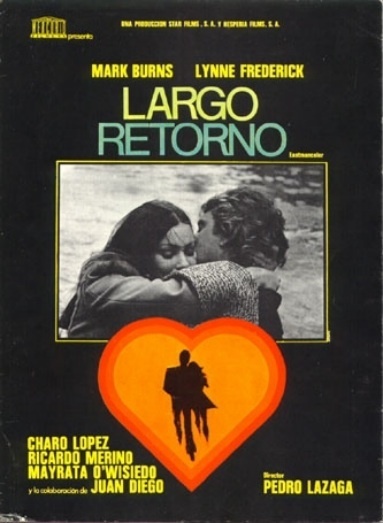
LARGO RETORNO/ A LONG RETURNING
Spain, 1975, 116 minutes, Colour.
Lynne Frederick, Mark Burns.
Directed by Pedro Lazarga.
A contrived and generally inconsequential Spanish romance. However, it has an interesting and intriguing central point. The first half of the film is conventional romantic material - aspiring young architect falls in love with attractive girl, they marry. Fortunately they belong to high society and are able to enjoy their honeymoon in Venice and make plans to build a lavish home. There is the accompaniment of mid-seventies' romantic modern music.
However, the film veers towards love story in the middle. The heroine contracts a disease which makes her moody. As she is hospitalised, the only possibility is for her to be put in suspended animation until a cure is found for her disease. Her husband agrees to this and the film moves towards science fiction. The husband lives on for forty years until a cure is found and his wife is then brought to life, a twenty year old in the year 2014, having to adapt to a new world and take up her life where it left off. She has to adjust to a husband forty years older, which she does until he soon dies. Once again, romantic conventions prevail. However, the medical ethics questions of suspended animation are presented in n. melodramatic and arresting kind of way. Mark Burns and Lynne Frederick are the English leads imported into Spain for the film.
1. The romantic portrait of the seventies, affluent society, Architects and their successful work, heiress’s romance, Venice honeymoon, a world of success?
2. The moving towards Love Story and the illness of the heroine?
3. Medical ethics questions about suspended animation? The morality of suspending life, the hope for cure, the extraordinary means, the cost? The visual presentation of illness. the suspending of life functions, the wrapping away of the heroine in the capsule?
4. The collage of time passing and the husband getting older?
5. The world of 2014 and its plastic look, uniforms - but still recognisable in continuity with the past? The decision for the heroine to come to life again?
6. Her process of adapting to the waking world, the new world? The help and lack of help from the doctors? The visit from Irene? The facing up to seeing David? The lyric scenes of their getting to know one another once again.
7. The impact of David's death and the heroine's grief? The doctor rescuing her at the end?
8. The bland conventionality of the romance themes? The raising of seemingly science fiction medical ethics questions and the exploration of such themes in the seventies and eighties? The value of dramatising these issues in films?